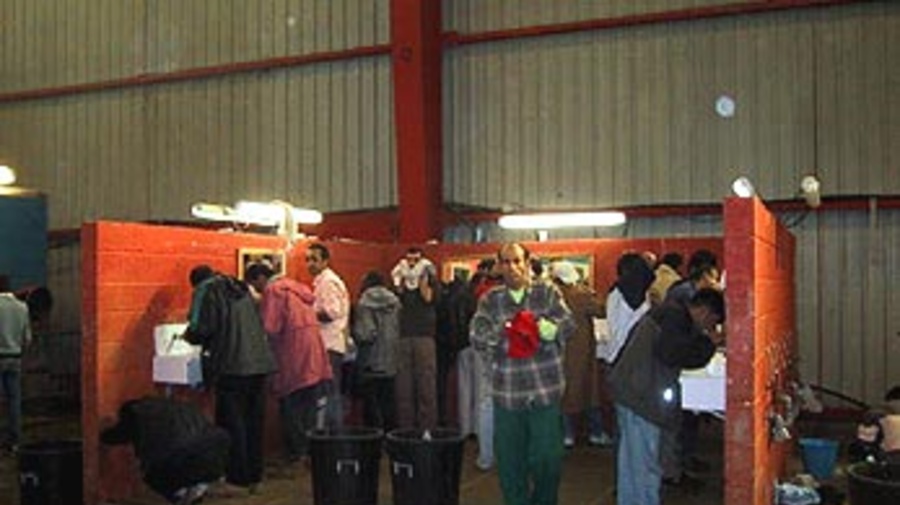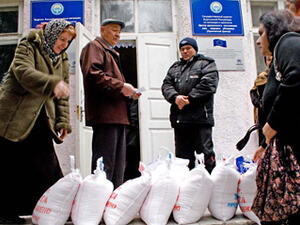UNHCR reports progress in Sangatte
UNHCR reports progress in Sangatte

Some 1,900 people share basic facilities at Sangatte reception centre.
CALAIS, France, November 22 (UNHCR) - The UN refugee agency reported Friday that progress was being made in resolving the Sangatte situation in France, with systematic individual interviews well under way, asylum claims starting to materialise and the first solutions being found for vulnerable cases, split families and others among the highly diversified residents of the centre.
Following an initial process of informal consultations and information sharing with the people in the Sangatte reception centre near Calais, UNHCR staff started one-on-one interviews with residents on November 13. So far, the agency's seven teams have interviewed more than 280 cases involving more than 300 individuals (including dependants). Interviews are now proceeding at a rate of 40-45 cases per day.
The interview process is very complicated, with around 40 different nationalities in the centre. More than 60 percent of the residents claim to be from Iraq, around 15 percent from Afghanistan and 5 percent from Sudan, but there are also 20 countries represented by only one or two individuals. In order to conduct interviews in the various languages, UNHCR has deployed staff who speak Arabic, Farsi, Dari and Pashto (the two main Afghan languages), Turkish, and the Kurdish languages. Interpreters are being used for other languages.
"This is helping establish trust," said Mostafa Khezry, who is heading the UNHCR team inside Sangatte. "When we first arrived here everyone was very uncertain. But now they can speak to us in their own language, they are beginning to loosen up, to realise that we're trying to help them find real solutions, and that there may be better ways to solve their predicament than by clinging to the undercarriage of trucks and trains."
There are now around 1,900 people in Sangatte with valid badges. Under a tighter system introduced after the centre was closed to new arrivals on November 5, people who spend a period of more than 72 hours away from Sangatte lose their badges, and with it the right to reside in Sangatte. There are currently around 1,500 people in the centre at meal times.
As part of the first phase of its operations in Sangatte, UNHCR concentrated on providing residents with a clear perspective of what their real options are and finding solutions to their individual predicaments.
Preliminary interviews revealed, for example, that some residents were not aware they could claim asylum in France, having been persuaded by people smugglers that the United Kingdom was the only place where they could do so. Others believed that if they did claim asylum in France, their chances of being granted refugee status were almost nil, whereas the real recognition rates for some nationalities, such as Iraqis, are much higher.
Since the November 5 cut-off date for new arrivals, 80 Sangatte residents have made asylum claims in France and are awaiting transfer out of the centre in accordance with an agreement between UNHCR and the French government. Another 46 people who applied for asylum prior to the cut-off date have already been moved to accommodation elsewhere in France.
"This is already a major difference," said Raymond Hall, UNHCR's Director for Europe. "Prior to the French government's decision to sort out Sangatte, and the start of UNHCR's operation inside the centre, hardly anyone in Sangatte was claiming asylum. The extent to which they were being misinformed by the smugglers is starting to become clear."

Sangatte's residents receive assistance as they await their turn at UNHCR interviews.
Before starting the systematic case-by-case interviews, UNHCR also focused on identifying vulnerable cases, whom it referred to the French authorities and the Red Cross for immediate transfer to more suitable accommodation. In co-operation with the Red Cross, identified unaccompanied minors have now been, or will shortly be, transferred out of the centre to specialised accommodation.
Other vulnerable cases identified so far include a paralysed Iraqi man who was unable even to use the shower facilities in Sangatte. He has now been taken elsewhere.
One particularly vulnerable woman, believed to have been tortured in her country of origin and badly in need of medical attention, had been in the centre with her three young daughters for several weeks before she was detected. She has also now been removed from Sangatte. It is believed that her husband may already have been authorised to remain in another European country, and UNHCR is actively exploring the possibility of family reunification.
UNHCR offices in London, Berlin, the Hague, Vienna and Paris are already involved in trying to facilitate solutions for 35 other family reunification cases or for people who have pending asylum claims in those countries. After checks with its Vienna office, the agency discovered that one man had in fact been recognised as a refugee in Austria - but had already left before learning of the decision. He will return to Austria on Monday after UNHCR arranged for him to receive the necessary travel documents.
Repatriation is another solution. After consulting UNHCR on the situation at home, a total of 12 Afghans in Sangatte have now taken advantage of the voluntary repatriation package offered by the French government and returned to Afghanistan. Another three Afghans living outside the centre - including one who has lived in France for 15 years - have also opted to go home.
The Sangatte reception centre is scheduled to close by April 2003.









